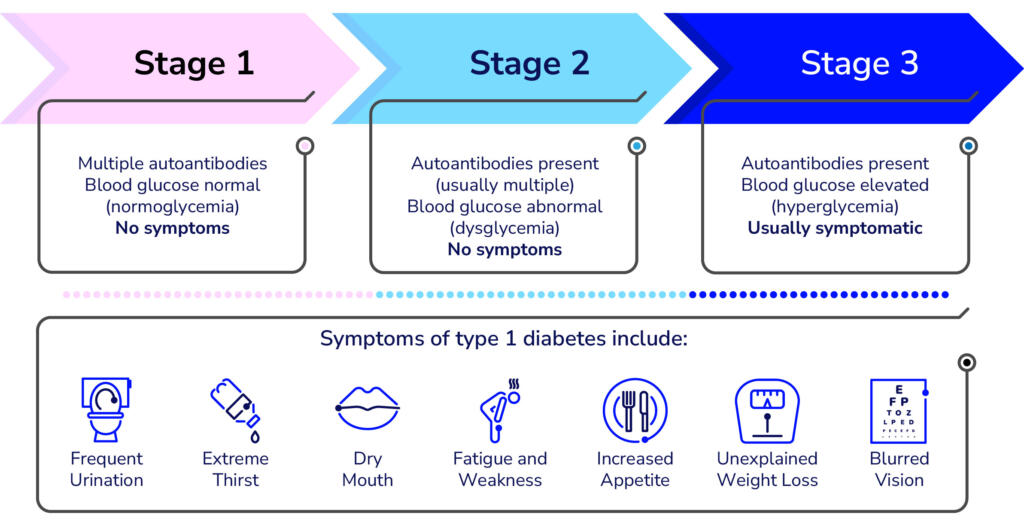
First T1D disease-modifying therapy
Breakthrough T1D celebrates the FDA approval of Tzield, the first disease-modifying therapy to delay clinical T1D in people at risk of developing the disease.
Knowing if you have type 1 diabetes autoantibodies gives you options. Detect so you can decide.

Type 1 diabetes can now be identified early (before insulin is required) with a simple blood test that looks for T1D autoantibodies.
Early detection has many proven benefits, including a reduced risk of diabetic ketoacidosis (DKA) at diagnosis, providing time to plan and prepare, and opening doors to research opportunities or available treatments.
T1D doesn’t show up overnight—it develops in stages over time. A simple blood test can identify proteins in the blood called autoantibodies. These proteins may signal that the body’s immune system is attacking cells in the pancreas that produce insulin. If a person has two or more persistent autoantibodies, it’s very likely they’ll develop T1D. Screening is all about knowing if these autoantibodies are present so that you can be prepared.
Your age, risk factors, and other criteria determine which screening options you’re eligible for.

Your doctor or your child’s doctor can order labs to detect T1D autoantibodies, and the cost may be covered by your insurance. Use our screening support guide to learn how you can get screened.
Autoantibodies that your provider should be testing for through labs include:
After testing, be sure to follow up. If autoantibodies are present, ask for repeat testing to confirm the presence of type 1 diabetes autoantibodies.
ASK (Autoimmunity Screening for Kids) provides early detection for T1D and celiac disease for all people ages 1-99 years in the United States. No family connection to T1D is required to participate in the ASK program.
TrialNet is a free, research-based T1D early detection and clinical trial program for family members of people with type 1 diabetes. This network of experts has sites throughout the United States, and T1D screening can be done through an at-home kit or in person.
The program is available for individuals between the ages of 2 and 45 years with a first-degree relative (parent, child, sibling) with T1D, ages 2 to 20 with a second-degree relative (cousin, grandparent) with T1D, OR anyone ages 2 to 45 years who has tested positive for at least one T1D-related autoantibody outside of TrialNet.

What can you gain from early detection of T1D? Hear from real people and families who made the decision to screen.
“Knowledge allowed us to enjoy life a little more.”
—Dana, living with T1D
“There’s so much power in being able to use your voice and your story.”
—Amy, living with T1D
“You can have a little bit of power over this challenging disease.”
—Amanda, living with T1D and mother of Emmie, who also lives with T1D
If you have positive screening results, the next important step is repeating the test to confirm, often called confirmatory testing. In addition to your own doctor’s office, TrialNet and Ask the Experts can help provide this confirmatory test.
T1D develops in stages over time. Early detection can help identify T1D before symptoms occur so that you and your healthcare provider can develop a monitoring plan. The chart below explains the different stages of T1D and the symptoms that families should be aware of during monitoring.

If your screening test is negative, this means you likely do not have type 1 diabetes autoantibodies at this time. Talk to your healthcare provider about participating in T1D screening again in the future, especially if you are under the age of 18.
Anyone who tests positive should share the information with their healthcare provider and ask for repeat testing to confirm the presence of T1D autoantibodies. Additionally, take advantage of one of the following free resources:
TrialNet is an international network of leaders in T1D research and clinical care with 27 centers in the United States. They will be able to confirm the results and may suggest additional testing. You can speak with an expert at TrialNet about your results by calling 1-800-425-8361.
Ask the Experts is a group of doctors and other healthcare professionals who can answer your questions about early detection, give individualized advice, and determine a plan for confirmatory testing. They can be reached by emailing Questions@AsktheExperts.org or by calling 303-724-1212.
If your results are positive and confirmed, you will need to be clinically monitored. If you have one autoantibody, your healthcare provider should monitor your autoantibodies and blood sugar every 6 to 12 months. If you have more than one, your healthcare provider should monitor your blood sugar every 3 to 12 months, depending on age.
If your results are negative and you’re under the age of 18, consider participating in T1D screening again in the future.
At Breakthrough T1D, we’re committed to connecting you with important research about T1D, early screening, and potential new therapies. Browse the latest research:

Breakthrough T1D celebrates the FDA approval of Tzield, the first disease-modifying therapy to delay clinical T1D in people at risk of developing the disease.

A recent study found that newly diagnosed individuals on a blood pressure medication were making more insulin one year after diagnosis than those on placebo.

Researchers are testing a drug to see if it can delay or prevent T1D in people ages 6 to 34 who have a 50% risk of clinical diagnosis within 2 years.
You can take part in new disease-modifying therapy (DMT) clinical trials and contribute to advancing treatments for T1D.